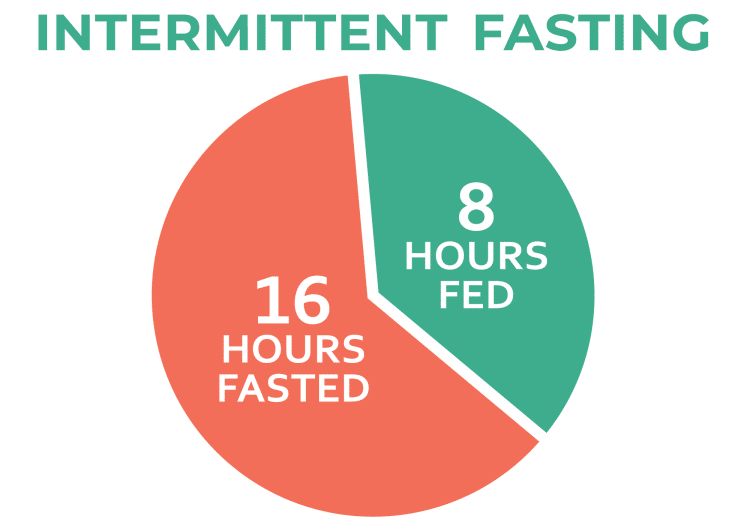In 1965, Agnus Barbieri of Scotland, who weighed a staggering 207 kilograms (456.3 pounds), left Maryfield Hospital in Dundee, having decided to stop eating until his weight reduced significantly. He relied solely on water, tea, and nutrient supplements for 382 days.
Yes, you read that right — this man fasted for over a year until he reached his goal weight of 82 kilograms (180 pounds), earning himself a place in the Guinness World Records. More importantly, he maintained his weight for years after that. (1)
What is Fasting?
Fasting involves voluntarily abstaining from food for a specific period. It encompasses different methods, ranging from shorter periods like intermittent fasting (e.g., the 16/8 method) to more extended periods like block fasting lasting several days. Initially rooted in religious and traditional practices, fasting evolved into a popular ad-hoc weight loss crash course in the 1970s. As its popularity surged, fasting gained the attention of health professionals, researchers, and social media platforms due to its perceived physical and mental benefits.
What is 7-Day Water Fasting?
The 7-day water fast is an extreme dieting approach in which individuals abstain from consuming anything except water for an entire week. This intensive fasting regimen is typically suggested for individuals with severe diabetes or obesity.
Is 7-Day Water Fasting Safe?
Going without food for even a day might be too much for some people. A week is not even a consideration. And, of course, most people question the water fast’s safety.
The good news is that water fasts are safe when done using proper guidelines. People have fasted for as long as a month without any major issues. Fasting for a week won’t lead to starvation. The body can continue functioning without food for seven days.
Contrary to popular belief, fasting isn’t synonymous with starving. Starving is when your body runs out of its fat stores and starts breaking down muscle tissue for energy, which can be fatal.
Fasting is more like burning wood to keep warm, whereas starvation is like burning your furniture out of desperation when you’re out of wood. (2)
Barbieri survived a year because he had a lot of fat to burn. Plus, he avoided malnutrition and starvation by using supplements. Therefore, adhering to the correct protocols is key to maximizing fasting benefits and staying safe.
You must get your doctor’s clearance before starting a fasting regimen if you:
- Have a medical condition
- Are taking medications
- Pregnant or trying for it
- Have eating disorders
- Recently underwent surgery
- Are over 70 or below 18 (3)
(Related: Is Water fasting Safe?)
How to 7-Day Water Fast
Water fasting is not too complicated, but you should follow some routines before and after fasting to mitigate any adverse health effects. Here’s the complete routine to follow during your 7-day water fast:
Pre-Fasting
You shouldn’t fast for more than three without medical supervision. It is essential to consult your doctor before starting a fast.
If you have never fasted for seven days before, it’s best to ease into it. Extended fasts are like running a marathon. You must train for months to build endurance. Try intermittent fasting or eating smaller meals for at least a month before attempting a 7-day water fast. Fasting for the first time can be challenging, and the 7-day fast shouldn’t be your first fasting experience.
Preparing for an extended water fast requires careful planning. Start your preparations at least a week before the fast. Gradually reduce the consumption of processed foods, alcohol, fried snacks, and refined carbs to avoid withdrawal symptoms that may occur from abrupt cessation. Instead, incorporate more fruits and vegetables into your meals to prepare your body and mind for the upcoming fast. (4)
Avoid overeating or having a large meal before beginning your fast. Bingeing and sudden calorie reduction can disrupt your hormonal balance and hamper the fasting benefits.
Mentally prepare yourself for your fasts. Fasting requires self-control and discipline. Clear your calendar and avoid social events like dinner dates or lunch meetings while fasting. Fasting alongside a friend can make you more accountable.
Fasting can affect individuals differently, and listening to your body throughout the process is crucial. Stop the fast and seek medical care if you experience adverse effects or discomfort.
While Water Fasting
During a 7-day water fast, the only beverage you consume is water. This means no calories and no salt in your diet. Studies suggest drinking two to three liters of mineral water daily while fasting. (5)
While some fast purists prefer drinking only water, it’s essential to consider the potential electrolyte imbalances, especially with sodium, that can occur during more extended fasting periods. To avoid adverse side effects, you can include the following beverages (hot or cold) besides water in your routine:
- Flat / Carbonated / Mineral water with additives: You can add lime, vinegar, Himalayan salt, chia seeds, ground flaxseed, or electrolyte supplements to your water. However, avoid sweetened powders or drops, even if they are sugar-free, as they can disrupt the fasting process.
- Black coffee: Coffee without sugar or milk is permissible during the fast.
- Herbal teas: Green tea, cinnamon tea, peppermint tea, black tea, oolong tea, and bitter melon tea are hydrating options that offer various health benefits. Do not add any sugar or dairy products to these teas.
- Homemade broth: You can make broth using animal or fish bones or vegetables to help you get through the day when fasting symptoms become challenging. Avoid store-bought broth and refrain from using root vegetables. 2)
(Related: Does Salt Break a Fast?)
It’s crucial not to consume more excess water during the fast to avoid hyponatremia (water intoxication). Hyponatremia occurs when the sodium in the blood becomes too diluted, leading to symptoms like nausea, dizziness, confusion, and other complications.
Proper hydration and electrolyte balance ensure a safe and successful fasting experience.
Stages in a Water Fast
During a water fast, your body goes through the following stages:
- Stage 0: After the last meal, your body digests the ingested food, leading to elevated blood sugar and insulin levels for a few hours. Eventually, they drop.
- Stage 1: It takes about twelve hours for your body to exhaust the glucose from your last meal, prompting it to rely on glycogen reserves for energy, thus returning sugar levels to normal.
- Stage 2: Approximately eighteen hours into water fasting, your body depletes its glycogen stores and enters ketosis, burning fat for fuel. This may happen sooner or later, depending on your last meal and fat reserves. (6)
- Stage 3: At the twenty-four-hour mark, your body enters the autophagy phase, during which it repairs itself by breaking down and recycling damaged or unnecessary cellular components, benefiting cellular rejuvenation and overall health. Autophagy has been associated with preventing cancer, neurological issues, oxidative stress, inflammatory diseases, and premature aging. (7)(8)
- Stage 4: After 48 hours of fasting, your body continues to rebuild cells (autophagy) and burn fat (ketosis), resulting in reduced food cravings due to increased ketone production and enhanced mental clarity. Additionally, human growth hormone (HGH) levels rise significantly, further promoting cell and tissue repair. Although the body still produces ghrelin (hunger hormone), its levels are considerably lower. That means you will experience reduced hunger after this.
- Stage 5: At the 60-hour fasting mark, insulin resistance decreases considerably, leading to a gradual decline in insulin levels. Ketosis is further accelerated to prevent muscle loss.
- Stage 6: Beyond 72 hours of fasting, your immune system strengthens further, and you experience the benefits at an even faster rate, unlocking additional advantages of fasting for your overall well-being. (9)(10)
(Related: How Long Does It Take to Enter Ketosis While Fasting? Fast Track Your Weight Loss)
Breaking the Fast
Don’t break your seven-day fast with huge servings of your favorite junk food as soon as the clock hits the 168th hour. Just be patient and resume your regular meals at their usual times as if you never fasted. Make it a smooth transition back to your regular eating routine.
As you break your fast, avoid high-carb meals, nuts, dairy products, alcohol, and eggs.
Resist the temptation to indulge in a large meal immediately. A sudden surge in glucose levels may negatively impact your gut health. Sudden changes in fluid and electrolyte levels can also cause the refeeding syndrome. (11)
Start with smaller meals like smoothies or broth and wait an hour before having a more substantial meal. Gradually increase your calorie intake over the following 1–3 days.
Even though you spent a week consuming nothing but water, don’t reduce your fluid intake after the fast. Drink a glass of water before and after breakfast.
Notably, you shouldn’t do the 7-day water fast more than once a month. This ensures your body has adequate time to recover.
What to Expect
If you’re new to the 7-day water fast, adjusting might take some time. Knowing what to expect during fasting can help you prepare for it.
The Bad
Resisting Hunger Can Be Tough
Hunger is the most noticeable outcome of fasting. It’s natural to feel hungry when you go without food for a while. However, contrary to common belief, you are not hungry throughout the week. For most people, the intense hunger typically subsides after the first two days. If you feel hungry, slowly sipping on any recommended beverages can help you manage it.
Lightheadedness Can Impact Daily Life
Feeling dizzy during fasting is often a sign of dehydration and low blood pressure. To alleviate this, have mineral water with a pinch of salt (together or separately). If you are dizzy, sit or lie down until it passes. If the dizziness lasts longer than a few minutes, consult your doctor immediately. Avoid driving or doing anything that requires focus or balance.
Headaches Can Be Unsettling
Headaches can occur due to sudden changes in your diet while fasting. While you can’t prevent them entirely, headaches caused by fasting tend to become less frequent with time.
Constipation Is a Possibility
It’s normal for bowel movements to decrease when there’s no fiber or food intake. Unless it causes significant discomfort, there’s usually no need to worry about it.
Watch Out for Heartburn When You Break Your Fast
This can occur due to the sudden intake of large amounts of food or lying down right after a meal. Avoid overeating after fasting to ease heartburn, and consider elevating your head while sleeping.
Bad Breath Makes Social Interactions Awkward
Bad breath while fasting is common. With no food to break down, saliva production is reduced during fasting. Its ability to remove food bacteria from the mouth also diminishes. This causes dry mouth and increased bacteria that cause a foul odor. To combat this, remember to brush your teeth regularly and stay hydrated.
Muscle Cramps Can Hold You Back
Since fasting is a zero-salt diet, it can lead to electrolyte imbalances, particularly magnesium, which is crucial for muscle function. Overexertion and dehydration during fasting can also strain muscles and lead to cramps. Taking over-the-counter magnesium supplements or having Epsom salt baths can promote relaxation and reduce cramps.
Other Effects
Some people may experience lethargy and brain fog during fasting. However, these symptoms often improve as the body gets accustomed to fasting. Many individuals report enhanced mental clarity a few days into an extended fast. (2)
When done incorrectly, prolonged fasting can cause loss of muscle mass. It can also lead to orthostatic hypotension and worsen existing medical conditions.
(Related: 10 Signs that Indicate You should Stop Water fasting)
The Good
Easy
Fasting is pretty straightforward — just don’t eat! It largely depends on your mindset and attitude. Having a positive mindset and a clear purpose behind fasting makes it easier. Plus, you’ll save a good amount of money in the process.
Boosts Productivity
Fasting triggers hormones like adrenaline that increase your energy levels. With no meals to worry about, you’ll have more time to be productive. You’ll notice enhanced mental clarity, improved attention, and laser-sharp concentration as the days pass. Research has shown that fasting can help with hypertension and reduce anxiety. (12)
Building Discipline
Resisting the temptation to eat during a fast is an excellent way to cultivate discipline. It demands commitment, especially when dealing with social gatherings or external influences. Fasting serves as a powerful training ground for practicing self-control. Completing the fast and losing weight can boost your self-esteem and confidence, knowing you’ve accomplished something challenging and beneficial for your health.
Retunes Your Taste Buds
Fasting rewires your taste buds through a process called neuroadaptation (13). You will experience an improved sense of taste and smell for nutritious food. This makes incorporating healthier foods easier in the future.
Benefits of Fasting
Modern research has shed light on the potential advantages of water fasting. Prolonged Fasting, if done safely, comes with various health benefits:
- Promotes weight loss (14)
- Induces autophagy and cell repair
- Therapeutic for chronic pains
- Reduces oxidative stress
- Improves insulin and blood sugar levels (15)
- Detoxification and a healthy liver
- Reduces the risk of various diseases like cancer and Alzheimer’s (16)
- Reduces blood pressure (17)
(Related: Water Fasting Weight Loss Calculator)
FAQs
How do you deal with hunger pangs during a water fast?
Keep yourself busy and try not to think too much about food while fasting. Hunger is often more in the mind. It isn’t constant. It comes in waves. Distract yourself with activities until the craving passes, and you’ll find fasting easier to handle.
How do I know if I am fasting right?
Pay attention to your body and know when to stop fasting. It’s not for everyone, and you must stay within your limits. Losing consciousness, confusion, bad headaches, stomach discomfort, or alarming heart palpitations are signs you should break your fast and consult a doctor.
Can I fast if I am diabetic?
Yes. You diabetics can fast. However, you need to consult your doctor before doing so. Continuing normal insulin doses while fasting can cause hypoglycemia, which can be life-threatening. Your blood sugar levels must be monitored closely and regularly if you choose to fast. (3)
Can I exercise while fasting for seven days?
Yes, you can. Your body has sufficient fat to provide energy during exercise. However, you might feel slightly strained or tired as your muscles adapt to burning fat. To play it safe, stick to yoga or low-intensity workouts during fasting to avoid overexertion.
Bottom Line
Fasting offers many potential benefits, but it’s essential to approach it with caution and mindfulness. It may not be suitable for everyone, and people’s responses to fasting can differ. When done responsibly and safely, fasting can be a valuable component of a balanced lifestyle and overall approach to health and well-being.
References
- The tale of Angus Barbieri who fasted for more than a year – and lost 21 stone. (2016, November 12). The Courier.
- Fung, J. (2016). The Complete Guide to Fasting: Heal Your Body Through Intermittent, Alternate-Day, and Extended Fasting. Victoria Belt Publishing Inc.
- Attinà, A., Leggeri, C., Paroni, R., Pivari, F., Dei Cas, M., Mingione, A., Dri, M., Marchetti, M., & Di Renzo, L. (2021, May 7). Fasting: How to Guide. Nutrients, 13(5), 1570.
- Hartley, J. (n.d.). Beginner’s Guide to Fasting. (Willis-Knighton Diabetes & Nutrition Center).
- Ogłodek, E., & Pilis, Prof., W. (2021, January). Is Water-Only Fasting Safe? Global Advances in Health and Medicine, 10, 216495612110311.
- Sanvictores T, Casale J, Huecker MR. Physiology, Fasting. (Updated 2022 Jul 25). In: StatPearls (Internet). Treasure Island (FL): StatPearls Publishing; 2023 Jan-. Available from:
- Pietrocola, F., Demont, Y., Castoldi, F., Enot, D., Durand, S., Semeraro, M., Baracco, E. E., Pol, J., Bravo-San Pedro, J. M., Bordenave, C., Levesque, S., Humeau, J., Chery, A., Métivier, D., Madeo, F., Maiuri, M. C., & Kroemer, G. (2017, February 6). Metabolic effects of fasting on human and mouse blood in vivo. Autophagy, 13(3), 567–578.
- Condello, M., Pellegrini, E., Caraglia, M., & Meschini, S. (2019, February 8). Targeting Autophagy to Overcome Human Diseases. International Journal of Molecular Sciences, 20(3), 725.
- Sayer, A. (2023, May 31). The 6 Stages Of Water Fasting: The Complete Water Fasting Timeline. Marathon Handbook.
- Dalton Combs PhD, D. T. (2021, May 7). Metabolic Step-By-Step: Stages of Fasting In The First 72hrs – Temper. Temper.
- Persaud-Sharma D, Saha S, Trippensee AW. Refeeding Syndrome. (Updated 2022 Nov 7). In: StatPearls (Internet). Treasure Island (FL): StatPearls Publishing; 2023 Jan-. Available from:
- Goldhamer, A., Lisle, D., Parpia, B., Anderson, S. V., & Campbell, T. (2001, June). Medically supervised water-only fasting in the treatment of hypertension. Journal of Manipulative and Physiological Therapeutics, 24(5), 335–339.
- Klaper, D. M. (2014, March 12). FASTING – An Effective Ancient Therapy for Today’s Health. Center for Nutrition Studies.
- Wilhelmi de Toledo, F., Grundler, F., Bergouignan, A., Drinda, S., & Michalsen, A. (2019, January 2). Safety, health improvement, and well-being during a 4 to 21-day fasting period in an observational study including 1422 subjects. PLOS ONE, 14(1), e0209353.
- Jørgensen, S. W., Hjort, L., Gillberg, L., Justesen, L., Madsbad, S., Brøns, C., & Vaag, A. A. (2021, February 1). Impact of prolonged fasting on insulin secretion, insulin action, and hepatic versus whole-body insulin secretion disposition indices in healthy young males. American Journal of Physiology-Endocrinology and Metabolism, 320(2), E281–E290.
- Nencioni, A., Caffa, I., Cortellino, S., & Longo, V. D. (2018, October 16). Fasting and cancer: molecular mechanisms and clinical application. Nature Reviews Cancer, 18(11), 707–719.
- Scharf, E., Zeiler, E., Ncube, M., Kolbe, P., Hwang, S. Y., Goldhamer, A., & Myers, T. R. (2022, March 11). The Effects of Prolonged Water-Only Fasting and Refeeding on Markers of Cardiometabolic Risk. Nutrients, 14(6), 1183.
منبع: https://fitnessvolt.com/7-day-water-fast/


